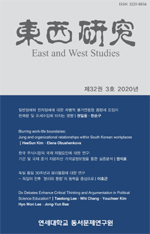본 연구는 미․중 전략경쟁, 미․러 갈등, 북핵문제 등 복합위기 속에서 북․중․러의 밀착 현상을 조정게임과 조정문제를 통해 분석하고자 했다. 이들의 밀착은 ‘신냉전’이라는 환경 속에서 반동적 대미정책 및 한․미․일 연합과의 대립을 기반으로 포컬포인트를 상정하고 연합을 만들며, 전략을 조정한다. 하지만 신냉전에 대한 관점이 다르고, 외부적 요인에 따른 포컬포인트로 인해 전략적 불확실성을 초래한다. 또한, 제도로서 안정적인 대연합을 구성하는 것이 어렵고, 이익에 따라 결합하는 특정 연합이 형성되면 방기 리스크가 존재하게 된다. 더 나아가, 연합 내 훼방자가 발생하고, 이에 연루될 것을 다른 국가들이 두려워하며 연합이 지속될 수 없게 된다. 이에, 북․중․러의 연합의 지속가능성이 작아지고, 일시적인 밀착 현상 속에서 비협조적인 행위가 발생할 것으로 전망된다.
This study analyzes the North Korea, China, and Russia coalition amidst complex global crises like the US-China strategic competition, the US-Russia crisis, and the North Korean nuclear issue, using coordination games and problems as analytical tools. In the ‘New Cold War’ context, they identify a focal point, form coalitions, and coordinate strategies based on reactive anti-US policies and confrontations with coalitions involving ROK, the US, and Japan. However, differing perspectives on the ‘New Cold War’ and external factors leading to divergent focal points resulted in strategic uncertainty. Forming a stable grand coalition as an institution is challenging, and there is a risk of abandonment when forming a specific coalition based on interests. Moreover, the emergence of spoilers within the coalition breeds apprehension among other nations, rendering the coalition unsustainable. Consequently, the sustainability of the North Korea-China-Russia coalition diminishes, fostering ongoing non-cooperative behavior amidst a temporary phase of adhesion.
Ⅰ. 서론
Ⅱ. 북·중·러 연합과 조정문제(Coordination Problem)
Ⅲ. 북·중·러 연합의 조정문제 분석 및 전망
Ⅳ. 결론
참고문헌
